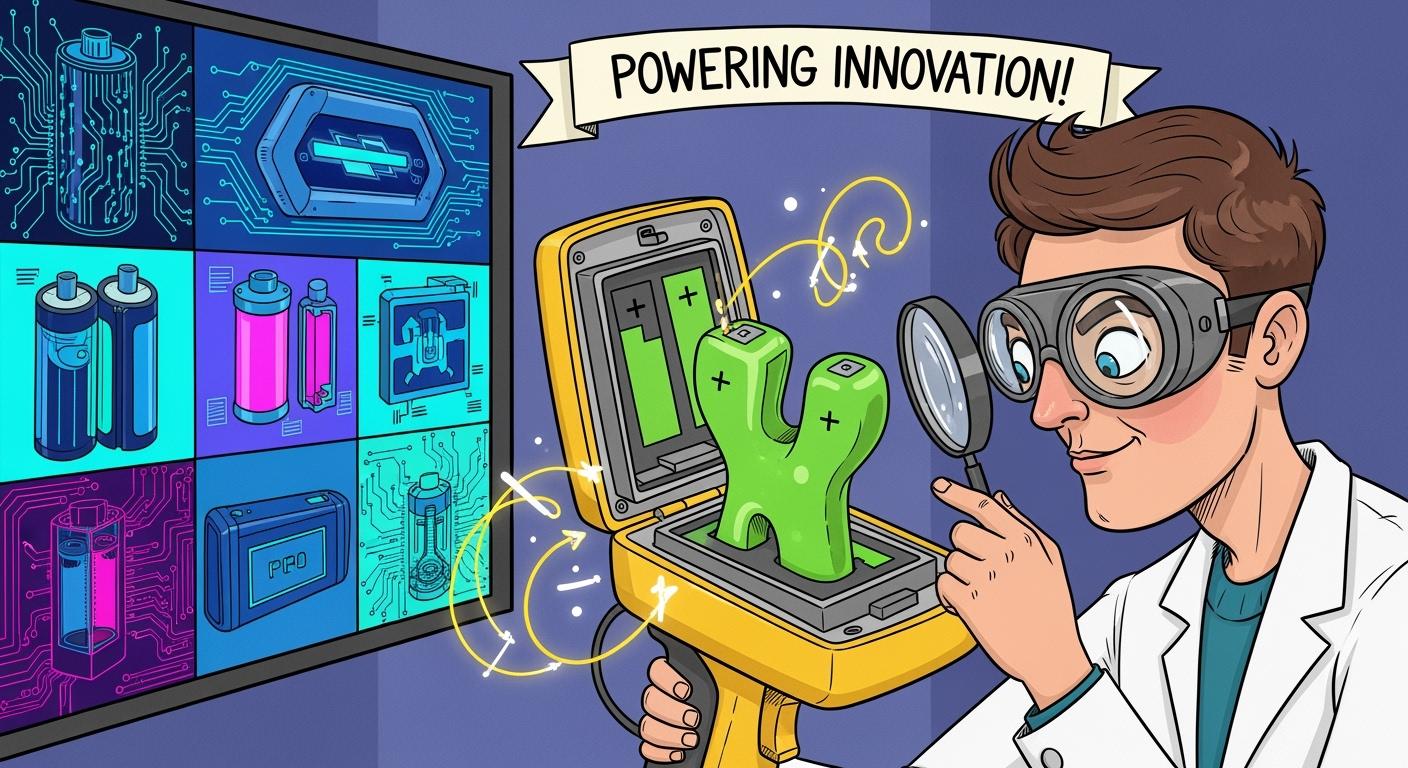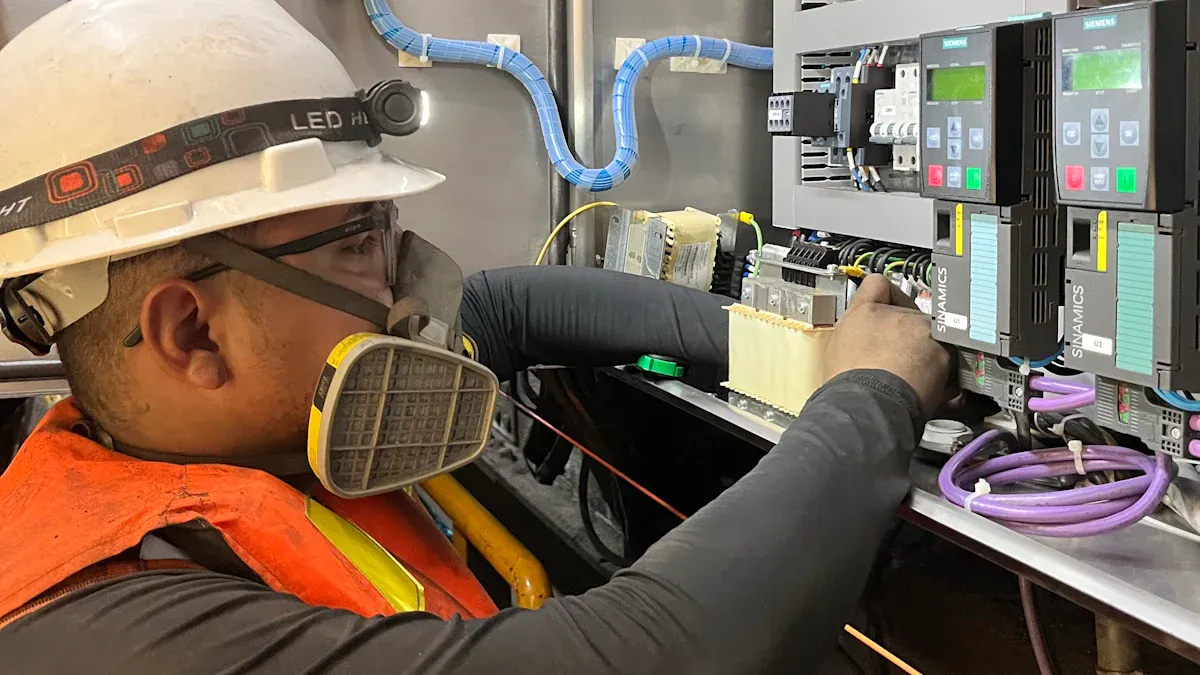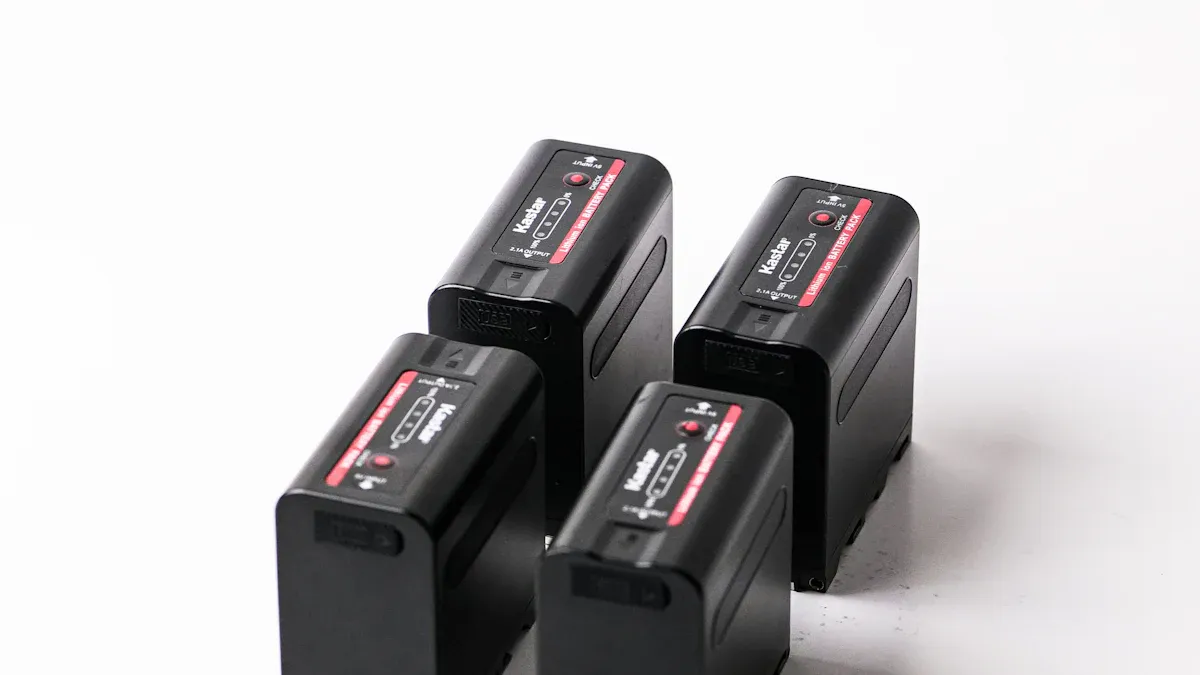
You face demanding choices when selecting batteries for power inspection devices. Standard batteries often fail in environments with low temperatures, high humidity, or compact designs. Lithium battery chemistries like LiFePO4, NMC, and LTO offer custom voltage and cycle life options that boost reliability. Custom battery management systems help you meet strict safety standards and operational needs.
Below is a table showing common operational environments and their requirements:
Operational Environment | Requirements |
|---|---|
Low temperatures (-20℃) | Discharge degradation management |
High energy density | Extended operation support |
IP65 protection | Dust and water resistance |
High-humidity, high-temperature (–10℃ to +60℃) | Reliable performance in hazardous conditions |
Compact size | Lightweight handheld use |
IP67-level sealing | Dust and moisture protection |
Custom lithium battery solutions help you achieve safe, efficient, and long-lasting device performance.
Key Takeaways
Custom lithium batteries outperform standard options in harsh environments, ensuring reliable performance for power inspection devices.
Advanced battery management systems enhance safety and efficiency, reducing downtime and maintenance costs for critical applications.
Tailored battery solutions allow for optimal capacity and form factor, meeting the specific needs of various industries like medical and robotics.
Investing in custom battery technology leads to longer device lifespans and improved operational efficiency, supporting growth in demanding sectors.
Quality assurance and early defect detection are essential for maintaining high standards in battery performance and safety.
Part1: Power Inspection Devices’ Unique Demands

1.1 Advanced Functions and Energy Needs
You see rapid growth in the market for power inspection devices. These devices now support advanced functions such as real-time monitoring, predictive analysis, and automated reporting. You need batteries that deliver consistent power for high-performance sensors and processors. Lithium chemistries like LiFePO4, NMC, LCO, LMO, LTO, solid-state, and lithium metal offer platform voltages from 3.2V to 3.7V, energy densities from 120 Wh/kg to 260 Wh/kg, and cycle lives ranging from 1,000 to over 5,000 cycles.
Note: Medical equipment, industrial robots, and security systems require batteries with high reliability and stable output. These sectors drive the demand for lithium batteries and push the market toward custom solutions.
You must consider how battery technology supports continuous grid analysis and infrastructure monitoring. The market expects devices to operate in harsh environments, so you need batteries that withstand temperature extremes and vibration.
1.2 Mobility and Extended Operation
You rely on portable power inspection devices for fieldwork in industrial, infrastructure, and consumer electronics sectors. Mobility creates new challenges for battery maintenance and uptime. Lithium batteries provide lightweight, compact designs that support handheld use and remote deployment.
You benefit from dc battery systems that extend operational time and reduce downtime.
The market shows strong growth in demand for lithium batteries with long cycle life and high energy density.
Trends in robotics and security systems highlight the need for batteries that maintain reliability during extended missions.
You must select battery solutions that balance weight, size, and performance. The market rewards devices that deliver reliable operation and minimize maintenance. You see how battery technology shapes the future of power inspection devices.
Part2: Battery Limitations in Inspection Devices
2.1 Standard Battery Compatibility Issues
You encounter many compatibility challenges when using standard batteries in power inspection devices. Manufacturers often design proprietary battery management systems, which complicate cross-brand usage. Voltage mismatches create technical obstacles that go beyond physical connections. You must also consider safety risks, since cross-brand compatibility may introduce hazards not validated through rigorous testing. Each manufacturer optimizes battery-tool integration, so you face performance issues when using non-matching brands.
Here is a table summarizing the most common compatibility issues:
Compatibility Issue | Explanation |
|---|---|
Proprietary Technologies | Manufacturers use proprietary Battery Management Systems (BMS) that complicate cross-brand usage. |
Voltage Mismatches | Different voltage specifications create technical obstacles beyond just physical connections. |
Safety Concerns | Cross-brand compatibility may introduce safety risks not validated through rigorous testing. |
Performance Optimization | Each manufacturer optimizes battery-tool integration, leading to performance issues with non-matching brands. |
You must match voltage between the tool and battery. Connector type must align for proper fitting. Battery chemistry should ideally match for optimal performance. These requirements limit your flexibility and increase the complexity of battery maintenance. The market for power inspection devices continues to grow, but standard batteries often fail to meet the evolving needs of advanced technology.
Tip: When selecting batteries for medical equipment, robotics, or security systems, always verify compatibility with your device’s battery management system. This step helps you avoid costly downtime and safety risks.
2.2 Reliability and Lifespan Concerns
You need batteries that deliver consistent reliability and long operational life. Standard batteries often fall short in demanding environments, such as grid monitoring, industrial inspections, and infrastructure analysis. The market expects devices to operate in harsh conditions, including low temperatures, high humidity, and vibration. Standard solutions struggle to maintain performance under these stresses.
Let’s compare standard and custom lithium battery solutions:
Feature | Standard Batteries | Custom Lithium Battery Solutions |
|---|---|---|
Chemistry | Limited (often NiMH, basic Li-ion) | LiFePO4, NMC, LCO, LMO, LTO, solid-state, lithium metal |
Platform Voltage | 1.2V–3.7V | 3.2V–3.7V |
Energy Density | 80–150 Wh/kg | 120–260 Wh/kg |
Cycle Life | 500–1,000 cycles | 1,000–5,000+ cycles |
Form Factor | Fixed, limited options | Customizable for device integration |
Safety Features | Basic | Advanced BMS, enhanced safety protocols |
Reliability | Moderate | High |
You see that custom lithium battery solutions offer higher energy density, longer cycle life, and advanced safety features. These improvements support the growth of the market for power inspection devices. You benefit from tailored capacity and form factor, which allow you to integrate batteries into compact designs for handheld use or remote deployment.
The demand for lithium batteries continues to rise in medical, robotics, and security systems. You must address battery maintenance and reliability to ensure uninterrupted operation. Trends in dc battery systems show that custom solutions outperform standard batteries in both performance and uptime. The market rewards devices that deliver reliable monitoring and analysis, especially in industrial and infrastructure sectors.
Note: Custom lithium battery solutions help you meet strict reliability standards and extend device lifespan. You reduce maintenance costs and improve operational efficiency.
Part3: Custom Battery Solutions and Their Benefits

3.1 Tailored Capacity and Form Factor
You see rapid growth in the market for power inspection devices across medical, robotics, security systems, infrastructure, consumer electronics, and industrial sectors. Each application brings unique requirements for battery capacity, size, and performance. Standard batteries often cannot meet these needs. Custom battery solutions give you the flexibility to design batteries that fit your exact device specifications.
Personalized solutions allow you to match battery capacity and form factor to your device’s power and space constraints.
Flexible production processes let you adjust battery design as your market needs change.
Performance optimization ensures your devices operate at peak efficiency, even in demanding environments.
For example, lithium battery packs using chemistries like LiFePO4, NMC, LCO, LMO, LTO, solid-state, and lithium metal can be tailored to deliver platform voltages from 3.2V to 3.7V, energy densities from 120 Wh/kg to 260 Wh/kg, and cycle lives from 1,000 to over 5,000 cycles. You can select the right chemistry and configuration for your inspection robots, medical monitors, or industrial analyzers. This level of customization supports the ongoing growth of the market and meets the rising demand for lithium batteries in advanced inspection devices.
Custom inspection solutions help you integrate batteries seamlessly into compact or irregularly shaped devices, supporting both handheld and remote monitoring applications.
3.2 Safety and Durability Enhancements
You need batteries that deliver reliability and safety in every environment. Custom lithium battery solutions include advanced safety features that protect your devices and users. The table below highlights key safety features you can expect in modern custom battery packs:
Safety Feature | Description |
|---|---|
Overcharge Protection | Prevents charging beyond maximum voltage to avoid damage and hazards. |
Over-Discharge Protection | Disconnects the load when voltage drops below a safe level to prevent damage. |
Temperature Management | Uses thermal sensors and management systems to prevent overheating and thermal runaway. |
Short-Circuit Protection | Incorporates fuses and circuit breakers to disconnect the battery during a short circuit. |
Cell Balancing | Ensures even charge distribution among cells to prevent overcharging or over-discharging. |
Mechanical Design | Utilizes robust enclosures and ventilation to protect cells and manage heat. |
Compliance with Standards | Adheres to safety standards like UL 1642 and UN 38.3 to ensure safety benchmarks are met. |
Fire Suppression Measures | Includes fire-resistant materials and systems to manage potential fire incidents. |
Regular Testing and Maintenance | Implements testing protocols and maintenance schedules to ensure ongoing safety and performance. |
Custom lithium battery chemistries improve durability in harsh inspection environments. Rigorous quality assurance, early problem detection, and environmental simulation ensure your batteries withstand extreme temperatures, vibration, and humidity. You benefit from long-term reliability validation, which is critical for grid monitoring, industrial analysis, and security systems.
Evidence Type | Description |
|---|---|
Quality Assurance | Ensures optimal performance and long battery life through rigorous testing at all stages of production. |
Early Problem Detection | Testing for state of health (SoH), state of charge (SoC), and capacity helps identify issues early. |
Long-term Reliability Validation | Full charge/discharge cycles monitor health and performance, ensuring batteries can withstand harsh conditions. |
Environmental Simulation | Testing in simulated harsh conditions provides insights into battery performance and potential issues. |
You reduce battery maintenance costs and improve device uptime by choosing custom solutions with these safety and durability features.
3.3 Performance and Uptime Improvements
You want your inspection devices to deliver consistent performance and maximum uptime. Custom battery management systems (BMS) play a key role in achieving these goals. Advanced BMS technology provides high-precision monitoring, intelligent control, and efficient thermal management. These features help you avoid unexpected downtime and extend the operational life of your devices.
Feature | Description |
|---|---|
High-Precision Monitoring | Accurate temperature, voltage, and current readings through sophisticated sensors. |
Intelligent Control Algorithms | Predictive modeling and machine learning for anticipating battery behavior and optimizing charging. |
High Reliability | Built-in redundancy and fault-tolerant design ensure continuous operation despite component failures. |
Efficient Thermal Management | Maintains optimal battery temperature through integrated cooling systems. |
Flexibility in Customization | Customizable firmware, hardware, and protocols to meet specific client needs. |
You see these benefits in medical equipment, robotics, and security systems, where uninterrupted operation is critical. The market rewards devices that minimize downtime and deliver reliable monitoring and analysis. Custom battery solutions support the growth of the market by meeting the increasing demand for lithium batteries in advanced inspection devices.
Tip: To further enhance reliability and safety, consider integrating a custom battery management system. Learn more about battery management systems (BMS).
Custom battery solutions give you a competitive edge in a fast-growing market. You can meet the unique needs of your industry, whether you work in infrastructure, consumer electronics, or industrial sectors. As technology advances, you will continue to see new opportunities for growth and innovation in battery design and integration.
Part4: Industry Trends and Quality Assurance
4.1 Custom Battery Adoption in Modern Devices
You see rapid growth in the market for lithium battery packs across many industries. Automotive leads the way, especially for electric vehicles, where defect-free battery cells are critical. Consumer electronics drive demand for high-quality batteries in portable devices. Energy storage systems show strong growth as renewable energy sources require reliable battery solutions. Industrial applications need custom lithium battery packs tailored to specific performance needs.
Industry | Description |
|---|---|
Automotive | Largest application area, especially for electric vehicles, focusing on defect-free battery cells. |
Consumer Electronics | Driven by high demand for quality batteries in portable devices like smartphones and laptops. |
Energy Storage Systems | Rapidly growing area due to the need for reliable battery solutions for renewable energy sources. |
Industrial Applications | Requires custom battery solutions tailored to specific performance characteristics. |
You notice that medical, robotics, security systems, and infrastructure sectors also invest in custom lithium battery technology. The market expects batteries to deliver platform voltages from 3.2V to 3.7V, energy densities from 120 Wh/kg to 260 Wh/kg, and cycle lives from 1,000 to over 5,000 cycles. This trend drives further investment and innovation.
4.2 Maintenance and Lifecycle Impact
You must adapt your battery maintenance schedules when using custom lithium battery packs. Standard schedules do not always fit the unique requirements of custom solutions. You develop tailored maintenance procedures that match your device’s needs. This approach improves reliability and reduces downtime in grid monitoring and industrial analysis.
Perfect fit for application: Custom batteries maximize efficiency and minimize wasted space.
Optimized performance: Higher energy density and longer life lower lifecycle costs.
Advanced safety and reliability: Custom designs include protections that reduce battery maintenance expenses.
You see that the market rewards solutions that extend device life and reduce operational costs. Growth in lithium battery technology supports this shift.
4.3 Design and Supply Chain Challenges
You face several challenges when integrating custom lithium battery packs into inspection devices. Design teams struggle to acquire high-quality images of battery samples and often lack proper measurement tools. Inspection microscopes may not handle large or varied samples, and long analysis workflows can slow down production.
Supply chain complexities also impact the market. Design complexity increases with the variety of battery cell sizes and chemistries. Transportation issues, such as tariffs and strict shipping regulations, create unpredictable costs and delays. Regulatory requirements demand strict compliance, or you risk delayed product launches.
To ensure quality, you implement early defect detection, hyper-automation, and data analytics in your production process. These steps help you maintain high standards and support the growth of the lithium battery market. Industry standards continue to evolve, focusing on enhanced performance, improved safety, optimized size, and long-term cost-effectiveness. You can learn more about evolving battery standards from authoritative sources.
Tip: Incoming battery cell inspections are essential for quality assurance. Early detection of defects and advanced testing technology help you deliver reliable solutions to the market.
You see the market moving toward custom lithium battery solutions because standard options cannot meet your advanced energy, reliability, and operational needs. The table below shows why manufacturers choose tailored batteries for inspection devices:
Reason | Description |
|---|---|
Tailored Performance | Custom batteries optimize space, runtime, and efficiency for your application. |
Safety and Certification | Compliance with global standards ensures safe, legal use in every market. |
Smart Integration | Battery monitoring systems and battery safety monitoring improve control and analysis. |
Long-Term ROI | Custom solutions reduce replacement costs and extend battery backup power. |
You benefit from application-specific lithium chemistries like LiFePO4, NMC, LCO, LMO, LTO, solid-state, and lithium metal, with platform voltages from 3.2V to 3.7V, energy densities from 120 Wh/kg to 260 Wh/kg, and cycle lives up to 5,000 cycles. Ongoing innovation in battery technology and strict quality assurance will drive future market growth and reliability.
FAQ
What makes custom lithium battery packs essential for inspection devices?
You need custom lithium battery packs to match your device’s power, size, and safety requirements. Standard batteries cannot deliver the platform voltage, energy density, or cycle life needed for medical, robotics, and industrial inspection equipment.
How do lithium battery chemistries impact device performance?
You select chemistries like LiFePO4, NMC, LCO, LMO, LTO, solid-state, or lithium metal to achieve platform voltages from 3.2V to 3.7V, energy densities from 120 Wh/kg to 260 Wh/kg, and cycle lives up to 5,000 cycles. This improves reliability and uptime.
What are the latest trends in lithium battery inspection equipment?
You see trends in automation, advanced battery management systems, and rigorous quality assurance. These trends support investment in safer, longer-lasting batteries for security systems, infrastructure, and consumer electronics.
How does investment in custom battery solutions benefit your business?
You gain longer device lifespans, reduced maintenance costs, and improved safety. Investment in custom lithium battery packs helps you meet strict industry standards and supports growth in medical, industrial, and robotics sectors.
Why is quality assurance critical for lithium battery packs?
You rely on quality assurance to detect defects early and ensure consistent performance. Rigorous inspection and testing protect your devices in demanding environments, such as grid monitoring and industrial analysis.




